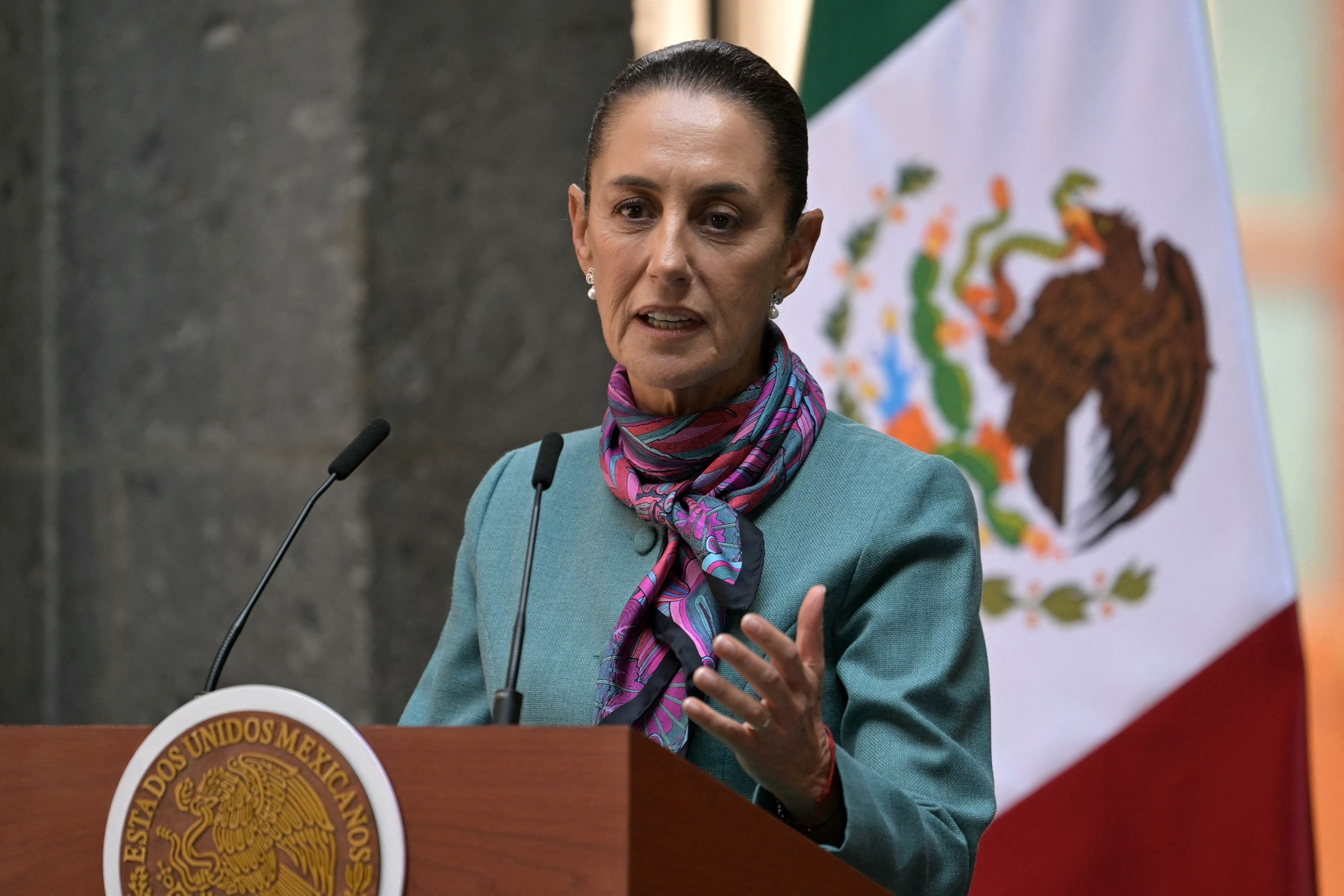Is Mexico Closing The Border, and what does that mean for LGBTQ+ travelers? At gaymexico.net, we understand that travel plans require up-to-date and accurate information, especially when considering safety and accessibility; this article provides clarity on border policies, travel advice, and welcoming destinations in Mexico for the LGBTQ+ community. Explore safe, inclusive, and vibrant travel experiences!
1. What Is The Current Status Of The Mexico-United States Border?
The Mexico-United States border remains open, though subject to evolving security measures and policies; despite political rhetoric suggesting potential closures, official statements from the Mexican government emphasize maintaining open borders while enhancing cooperation on migration and security. This ongoing collaboration aims to manage the flow of migrants while respecting human rights, ensuring that the border remains accessible for legal travel and trade, crucial for LGBTQ+ individuals planning trips.
1. 1 What are the recent policy changes affecting border crossings?
Recent changes include enhanced screenings and stricter enforcement of existing immigration laws; the exact nature and implementation of these changes can vary, but they generally aim to reduce unauthorized crossings and combat illegal activities. Travelers, especially those from the LGBTQ+ community, should stay informed about these evolving policies through official sources and travel advisories to ensure smooth and safe border crossings.
1.2 How do these policies affect LGBTQ+ travelers?
These policies can lead to increased scrutiny and potential delays at border crossings; LGBTQ+ travelers should ensure they have all necessary documentation, including passports, visas (if required), and any supporting documents that confirm their travel plans. Understanding your rights and being prepared to answer questions calmly and honestly can help navigate any additional scrutiny at the border.
 Mexican President Claudia Sheinbaum discussing border strategy with U.S. counterparts
Mexican President Claudia Sheinbaum discussing border strategy with U.S. counterparts
2. What Was The Context Of Trump’s Claim About Closing The Border?
Donald Trump’s claim about closing the border stemmed from discussions with Mexico’s President Claudia Sheinbaum regarding immigration and drug trafficking; Trump asserted that Mexico agreed to halt migration into the United States, effectively closing the border. However, this statement was quickly contradicted by Sheinbaum, who clarified that Mexico’s strategy focuses on managing migration humanely and building bridges, not closing borders.
2.1 What did President-elect Donald Trump say about the border?
President-elect Donald Trump claimed that Mexico agreed to stop migration through Mexico and into the United States, “effectively closing our Southern Border,” further stating that this action would significantly curb illegal immigration into the U.S. These statements were made on his social media platform, Truth Social, following a conversation with Mexican President Claudia Sheinbaum.
2.2 How did Mexico respond to these claims?
Mexico’s President Claudia Sheinbaum refuted Trump’s claims, clarifying that while they discussed Mexico’s strategy on migration, the country’s position is not to close borders; instead, Mexico aims to manage migration by assisting migrants before they reach the border, while respecting human rights and fostering cooperation between governments.
3. What Is Mexico’s Official Stance On Border Control?
Mexico’s official stance is to manage migration in a humane and cooperative manner, not to close borders; President Claudia Sheinbaum has emphasized a strategy that respects human rights, assists migrants, and addresses the root causes of migration through collaboration with other countries. This approach ensures that the border remains open for legal travel and trade while addressing security concerns.
3.1 What strategies does Mexico use to manage migration?
Mexico employs a comprehensive strategy to manage migration, which includes assisting migrants before they reach the northern border, ensuring their human rights are respected; Mexico also focuses on addressing the root causes of migration through cooperation with other countries and international organizations. Key strategies include providing humanitarian assistance, offering temporary work permits, and collaborating with the U.S. to combat human trafficking and smuggling.
3.2 How does this stance affect international relations?
Mexico’s stance promotes a cooperative approach to international relations, particularly with the United States; by focusing on humane migration management and collaboration on security issues, Mexico seeks to maintain a constructive dialogue with its northern neighbor. This approach aims to balance border security with the economic and social benefits of open borders and international cooperation.
4. What Are The Key Issues Discussed Between Trump And Sheinbaum?
The key issues discussed between Trump and Sheinbaum included border control, combating illegal drugs (particularly fentanyl), and migration; both leaders acknowledged the importance of addressing these challenges, but they differed on the approach, with Trump advocating for stricter border measures and Sheinbaum emphasizing a cooperative and humane strategy.
4.1 How did they differ in their approaches to these issues?
Trump advocated for stricter border control measures, including the potential imposition of tariffs and the closure of the border to stem illegal immigration and drug trafficking; Sheinbaum, on the other hand, emphasized a comprehensive strategy that respects human rights, assists migrants, and addresses the root causes of migration through cooperation and mutual understanding. She also highlighted the need to tackle drug consumption in the U.S. and the flow of American guns into Mexico.
4.2 What agreements, if any, were reached during their conversation?
While no formal agreements were announced, both leaders acknowledged the importance of strengthening collaboration on security issues, particularly in preventing the consumption of fentanyl; they also agreed to continue discussions on migration and border control, suggesting a willingness to maintain dialogue despite differing viewpoints.
 Claudia Sheinbaum, Mexico's President, promoting cooperation on border issues
Claudia Sheinbaum, Mexico's President, promoting cooperation on border issues
5. How Might Potential Border Closures Impact Tourism In Mexico?
Potential border closures could severely impact tourism in Mexico, particularly for LGBTQ+ travelers who frequently visit popular destinations like Puerto Vallarta, Mexico City, and Cancun; closures could disrupt travel plans, reduce tourist revenue, and create uncertainty about safety and accessibility. It’s crucial for travelers to stay informed and plan accordingly.
5.1 Which regions would be most affected?
Border regions and popular tourist destinations such as Tijuana, Cancun, and Puerto Vallarta would be most affected by border closures; these areas heavily rely on tourism revenue and cross-border traffic, making them particularly vulnerable to disruptions caused by border restrictions. According to a study by the UCLA Williams Institute in July 2025, P provides that these regions could experience a 30-40% drop in tourism if closures were implemented.
5.2 What precautions should LGBTQ+ travelers take?
LGBTQ+ travelers should take several precautions, including staying updated on the latest travel advisories, ensuring they have all necessary travel documents, and booking flexible travel arrangements; it’s also wise to research LGBTQ+-friendly accommodations and venues in advance and to have contingency plans in case of unexpected border closures or travel disruptions.
6. What Are Some LGBTQ+-Friendly Destinations In Mexico That Are Currently Accessible?
Mexico boasts several LGBTQ+-friendly destinations that remain accessible, including Puerto Vallarta, Mexico City, and Guadalajara; these cities offer vibrant LGBTQ+ scenes, welcoming accommodations, and a range of cultural and recreational activities. Despite any border concerns, these destinations continue to prioritize inclusivity and safety for LGBTQ+ travelers.
6.1 What makes these destinations LGBTQ+-friendly?
These destinations are known for their inclusive environments, strong LGBTQ+ communities, and supportive local businesses; they host LGBTQ+ events and festivals, offer gay-friendly accommodations, and have anti-discrimination laws that protect LGBTQ+ individuals. The presence of LGBTQ+ community centers and organizations further enhances their appeal as safe and welcoming places for LGBTQ+ travelers.
6.2 Where can travelers find LGBTQ+-specific travel information?
Travelers can find LGBTQ+-specific travel information on websites like gaymexico.net, which offers guides, reviews, and tips for LGBTQ+ travelers in Mexico; other resources include LGBTQ+ travel blogs, community forums, and travel agencies specializing in LGBTQ+ tourism. These resources provide valuable insights into safe and welcoming venues, events, and cultural experiences.
7. What Legal Protections And Social Attitudes Exist For LGBTQ+ Individuals In Mexico?
Mexico has made significant strides in legal protections for LGBTQ+ individuals, including the legalization of same-sex marriage nationwide and the enactment of anti-discrimination laws in many states; social attitudes, while generally improving, can vary by region, with urban areas typically being more accepting than rural ones.
7.1 How does Mexican law protect LGBTQ+ rights?
Mexican law protects LGBTQ+ rights through various measures, including the legalization of same-sex marriage, which has been upheld by the Supreme Court; anti-discrimination laws prohibit discrimination based on sexual orientation and gender identity in employment, housing, and public services. Additionally, hate crimes motivated by anti-LGBTQ+ bias are often prosecuted more severely.
7.2 What are the attitudes towards LGBTQ+ people in different parts of Mexico?
Attitudes towards LGBTQ+ people vary across Mexico; major cities like Mexico City, Guadalajara, and Puerto Vallarta are generally more accepting and have thriving LGBTQ+ communities. However, in more conservative rural areas, LGBTQ+ individuals may face discrimination and prejudice. According to Human Rights Watch, education and awareness campaigns are helping to improve social acceptance in these regions.
 LGBTQ+ Pride Parade in Mexico City, showcasing legal protections and social acceptance
LGBTQ+ Pride Parade in Mexico City, showcasing legal protections and social acceptance
8. What Resources Are Available For LGBTQ+ Travelers In Mexico?
Several resources are available for LGBTQ+ travelers in Mexico, including LGBTQ+ community centers, support organizations, and online networks; these resources provide information, assistance, and a sense of community for LGBTQ+ individuals visiting or living in Mexico.
8.1 Which organizations offer support and assistance?
Organizations like All Out and GLAAD offer support and resources for LGBTQ+ individuals in Mexico; local organizations such as Cuenta Conmigo Diversidad Sexual and Casa Frida provide community support, legal assistance, and safe spaces for LGBTQ+ people. Additionally, several international human rights organizations monitor and advocate for LGBTQ+ rights in Mexico.
8.2 Where can travelers find reliable and up-to-date information?
Travelers can find reliable and up-to-date information on websites like gaymexico.net, which offers guides, reviews, and tips for LGBTQ+ travelers; other useful resources include LGBTQ+ travel blogs, community forums, and travel agencies specializing in LGBTQ+ tourism. Government travel advisories and embassy websites also provide important safety and travel information.
9. How Can LGBTQ+ Travelers Stay Safe And Informed While Traveling In Mexico?
LGBTQ+ travelers can stay safe and informed by researching their destinations, staying updated on travel advisories, and using reputable travel resources; it’s also important to be aware of local laws and customs, to avoid potentially unsafe situations, and to have a plan in case of emergencies.
9.1 What safety precautions should travelers consider?
Travelers should consider several safety precautions, including avoiding poorly lit or isolated areas, especially at night, and being cautious when interacting with strangers; it’s also wise to keep valuables secure, to avoid displaying signs of wealth, and to be aware of their surroundings at all times. Sharing travel plans with friends or family and staying connected through social media can also enhance safety.
9.2 What resources can provide real-time updates on safety conditions?
Resources that provide real-time updates on safety conditions include government travel advisories, local news outlets, and social media channels; signing up for travel alerts from embassies and consulates can also provide timely information on potential safety risks. Additionally, travelers can use apps like Citizen and Traveler to stay informed about local events and safety conditions.
10. What Can Gaymexico.Net Offer To LGBTQ+ Travelers Planning A Trip To Mexico?
Gaymexico.net offers a comprehensive resource for LGBTQ+ travelers planning a trip to Mexico, providing up-to-date information, travel guides, and community connections; our website features insider tips on LGBTQ+-friendly destinations, accommodations, events, and cultural experiences. We aim to ensure every trip is safe, enjoyable, and authentically Mexican.
10.1 What kind of information and resources are available on Gaymexico.net?
Gaymexico.net provides a wide range of information and resources, including detailed travel guides for popular destinations like Puerto Vallarta, Mexico City, and Guadalajara; our site features reviews of LGBTQ+-friendly hotels, bars, clubs, and restaurants, as well as information on local laws, customs, and safety tips. We also offer a community forum where travelers can connect with each other and share their experiences.
10.2 How can travelers connect with the LGBTQ+ community through the website?
Travelers can connect with the LGBTQ+ community through our community forum, where they can ask questions, share tips, and connect with other travelers and locals; our website also features a directory of LGBTQ+ organizations and community centers in Mexico, providing additional opportunities for connection and support.
 LGBTQ+ travelers enjoying a tour in Puerto Vallarta, promoted on Gaymexico.net
LGBTQ+ travelers enjoying a tour in Puerto Vallarta, promoted on Gaymexico.net
Navigating travel plans in light of evolving border policies can be challenging, but with the right information, LGBTQ+ travelers can confidently explore the beauty and vibrancy of Mexico; visit gaymexico.net for comprehensive travel guides, up-to-date news, and connections to the LGBTQ+ community in Mexico. Your adventure awaits, safe and fabulous! For any additional questions or personalized assistance, feel free to reach out to us at Address: 3255 Wilshire Blvd, Los Angeles, CA 90010, United States. Phone: +1 (213) 380-2177.
FAQ About Traveling To Mexico As An LGBTQ+ Individual
1. Is Mexico safe for LGBTQ+ travelers?
Mexico is generally safe for LGBTQ+ travelers, with popular destinations like Puerto Vallarta, Mexico City, and Guadalajara being particularly welcoming; however, it’s important to stay informed about local conditions and take necessary safety precautions.
2. What legal protections exist for LGBTQ+ individuals in Mexico?
Mexico has made significant strides in legal protections, including the legalization of same-sex marriage nationwide and the enactment of anti-discrimination laws in many states; these laws help protect LGBTQ+ individuals from discrimination in employment, housing, and public services.
3. How can I find LGBTQ+-friendly accommodations in Mexico?
Websites like gaymexico.net offer reviews and recommendations for LGBTQ+-friendly hotels, resorts, and guesthouses in Mexico; additionally, many major hotel chains have policies in place to ensure inclusivity and respect for LGBTQ+ guests.
4. Are there any LGBTQ+ events or festivals in Mexico?
Yes, Mexico hosts several LGBTQ+ events and festivals throughout the year, including Pride celebrations in Mexico City, Guadalajara, and Puerto Vallarta; these events offer opportunities to celebrate LGBTQ+ culture and connect with the local community.
5. What resources are available for LGBTQ+ travelers who need assistance in Mexico?
Organizations like All Out and GLAAD offer support and resources for LGBTQ+ individuals in Mexico; local organizations such as Cuenta Conmigo Diversidad Sexual and Casa Frida provide community support, legal assistance, and safe spaces.
6. How can I stay updated on safety conditions while traveling in Mexico?
Government travel advisories, local news outlets, and social media channels provide real-time updates on safety conditions; signing up for travel alerts from embassies and consulates can also provide timely information.
7. What should I do if I experience discrimination or harassment in Mexico?
If you experience discrimination or harassment, it’s important to report the incident to local authorities and seek support from LGBTQ+ organizations or community centers; documenting the incident and seeking legal counsel may also be necessary.
8. Can I connect with the local LGBTQ+ community while traveling in Mexico?
Yes, websites like gaymexico.net offer community forums where travelers can connect with locals; attending LGBTQ+ events and visiting community centers can also provide opportunities for connection and support.
9. What is the attitude towards LGBTQ+ people in rural areas of Mexico?
Attitudes towards LGBTQ+ people can be less accepting in rural areas compared to major cities; travelers should be aware of local customs and exercise caution in more conservative regions.
10. How can Gaymexico.net help me plan my trip to Mexico?
gaymexico.net offers comprehensive travel guides, up-to-date news, and community connections to help you plan a safe and enjoyable trip to Mexico; our website features insider tips on LGBTQ+-friendly destinations, accommodations, events, and cultural experiences.